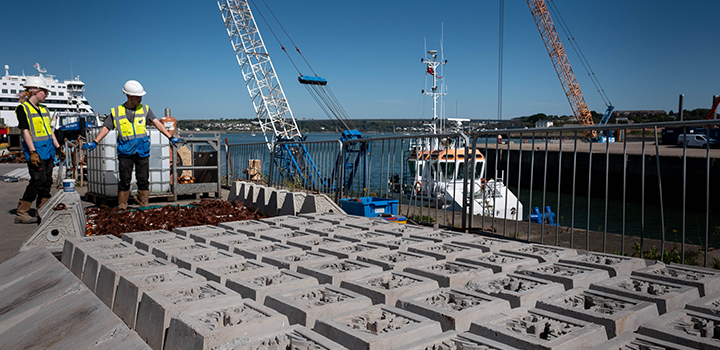Norfolk company making waves with nature inclusive designs to increase maritime biodiversity
By: Communications

A Norfolk company founded by a University of East Anglia (UEA) graduate has developed innovative, low-carbon, artificial reef units that simultaneously increase biodiversity while protecting crucial marine infrastructure such as turbine foundations and cable routes.
Exo Engineering International Ltd, based just outside Norwich, Norfolk and registered at The Enterprise Centre, UEA was created in 2022 as a sister company of Exo Environmental. Exo Engineering focuses on ‘’Greening of Grey infrastructure, and emerged following the success of Exo Environmental, founded by William Coulet in 2014 following a career with the Broads Authority and his graduation from MSc Environmental Sciences at UEA.
There are currently four UEA graduates employed by Exo Engineering, representing a significant proportion of the workforce. William Coulet explains the reason for this, saying:
“With the broad range of topics that are covered in Environmental Sciences degrees at UEA, students graduate with a well-rounded understanding of natural processes and climate change. From experience, this tells me that UEA graduates are well placed to quickly get started supporting the senior team members to deliver wide-ranging, impactful projects.”
Exo Environmental has been providing consultancy services for integrated sediment and water management with an emphasis on ecology and sustainability for nearly ten years. Exo Engineering emerged with a sole focus on the ‘development of eco-engineered solutions with nature inclusive design’.
The company have been involved with some pilot projects in the intertidal zone within East Anglia, namely off the Essex coast, but their largest work to date has taken place in Cornwall for the Sustainable And Resilient Coastal Cities (SARCC) project in which they produced twenty-two five-tonne units for the Newlyn breakwater.
The company’s latest development has seen them work in the Celtic Sea off the Pembrokeshire coast, supported by ORE Catapult’s Marine Engineering Energy Centre of Excellence (MEECE), META, offshore wind energy supplier Hiraeth Energy, and monitoring-camera company PEBL.

Image: Artist impression of the Pembroke deployment
More than 16 tonnes of units were deployed, including:
Two articulated concrete mattresses, one with nature-inclusive design and one without to act as a control
- One frond mattress with ecologically enhanced edge weighting
- Clusters of one large ExoHedron, four small ExoHedrons and ten ExoSpheres, with additional bundles of rocks to act as a control
- Six ExoSinkers with cameras for monitoring the attached units
It is anticipated that the units will lead to a gain in biodiversity levels, thanks to their unique ‘Hybrid Nature Inclusive Design’.

Image: Exo team members discussing how the units will be deployed in Pembroke Harbour
Will Melhuish, a UEA graduate himself and now Operations Manager at EXO Engineering, explains:
“Our units include features such as grooves and pits which aim to make surfaces more complex, mimicking naturally occurring habitats and therefore increasing the potential for marine species to colonise them. We will be monitoring the levels of biodiversity with a series of ecological surveys over an eighteen-month period, using techniques such as eDNA and underwater video to quantify the species present in the area surrounding the artificial reef units.”
With Biodiversity Net Gain (BNG) legislation coming into force for intertidal and terrestrial environments from early 2024, the team are expecting similar marine net gain laws to be enacted in the near future, something that is already causing pressure on developments in the Dutch North Sea.
Will Melhuish believes Exo Engineering’s experience and innovation puts them at the forefront of future developments, saying:
“There is some uncertainty as to how marine net gain laws will look in practice, but we believe we are ahead of the curve in being able to provide ready-made answers today for tomorrow’s environmental questions. We have already worked with several forward-thinking companies who believe in sound ecological solutions to protect present and future marine infrastructure, as a team we look forward to continuing to innovate and problem-solve alongside others who wish to collaborate with us.”
One key benefit of EXO Engineering’s solutions is that they can be installed using conventional measures, not just small, individual units that can be time and resource intensive to install, but larger ready-made units that can help lower the barriers for greater uptake of such ecological protection.
Related Articles

Blossoming partnership between UEA and Norfolk Wildlife Trust recognised with new Memorandum of Understanding
UEA and Norfolk Wildlife Trust have strengthened their blossoming partnership with the formal signing of a strategic Memorandum of Understanding (MoU), recognising a shared vision for nature and society.
Read more
Protect delicate polar ecosystems by mapping biodiversity
Polar regions contain vast, undiscovered biodiversity but are both the most-threatened and least-understood areas of the world.
Read more
Six UEA professors named in Highly Cited Researchers 2023 list
Six UEA professors have been named in the annual Highly Cited Researchers list for 2023, which celebrates some of the most influential researchers in the world today.
Read more